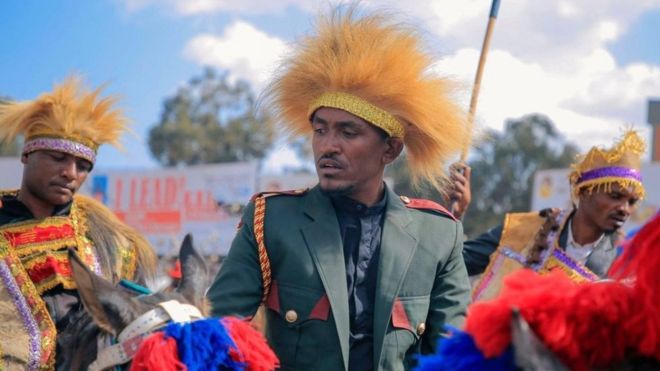Aljazeera: Haacaaluu Hundeessa: The protest singer who became an Oromo icon #HaacaaluuHundeessa July 4, 2020
Posted by OromianEconomist in Uncategorized.Tags: #OromoProtests, Hacaaluu Hundeessaa
trackback

Popular protest singer Haacaaluu Hundeessa, whose killing earlier this week sparked deadly unrest, was one of Ethiopia’s biggest music stars whose popular songs galvanised the youth of country’s largest ethnic group, the Oromo. Click here to read the full article
The 34-year-old’s music gave voice to Oromos’ widespread sense of economic and political marginalisation during years of protests that in 2018 led to the downfall of Ethiopia’s government, sweeping Abiy Ahmed – the country’s first Oromo prime minister – to power.
“He is somebody who is seen as icon for the more than 50 million Oromos who live in Ethiopia and across Africa,” Awol Allo, senior lecturer of law at Keele University in England, told Al Jazeera, describing him as “a towering musical genius”.
Haacaaluu sang in the Oromo language but his lyrics about yearning for freedom and exhorting Ethiopians to solve their problems touched a chord more broadly.
His first album was released in 2009, after he had served five years in prison for his political activism. It was during that time when he wrote most of his songs, according to a profile in O Pride, an Oromo magazine.
His second album two years later was a hit on Amazon, but it was his single “Maalan Jira?” (What fate is mine?), released just before a wave of government-backed evictions began around the capital, Addis Ababa, in 2015, that became a rallying cry.
The song has been viewed more than three million times on YouTube.
As the government wavered, in 2017 he released Jirra, a defiant cry meaning “We Are Here” – that has become a greeting among Oromo youth. That December, he sang at a star-studded concert in Addis Ababa to raise money for displaced Oromo families.
“When people were out on the street being shot at and being killed, he comforted the Oromo people with his songs of revolution, love and resistance to the system that oppressed [them],” Tsedale Lemma, editor-in-chief of the Addis Standard publication, told Al Jazeera.
“He leaves behind a legacy of a man [who] is the institution of the consciousness of the Oromo people,” she said, noting that he embodied the struggle of his people “for equality and justice”
Over the next two years, the protests spread far beyond the Oromia region, meeting a bloody response from security forces. About 30,000 people were jailed, including activists, writers and opposition leaders.
Eventually, Prime Minister Hailemariam Desalegn resigned in February 2018 – unprecedented in Ethiopian history. Abiy, whose father is Oromo, was appointed prime minister instead.
Abiy released the political prisoners, unbanned many political parties and promised free and fair elections.
But some Oromo say they are still suffering government persecution – part of the region is under federal military control.
Haacaaluu was shot dead in Addis Ababa on Monday by unknown gunmen and buried on Thursday at a church in Ambo, his hometown about 100km (60 miles) west of Addis Ababa.
“He was a true freedom fighter,” Belay Aqenaw, the funeral’s organiser, said in a speech. “He was a singer who raised our spirits.”
Haacaaluu’s murder sparked protests in the capital and across the Oromia region which surrounds Addis Ababa.
Oromia regional police said on Thursday that 87 people, including four of the region’s police officers, had been killed over the last three days, with 76 seriously injured.
In a separate statement, Addis Ababa’s police said 10 people had been killed in the capital over that period, including two officers, which raises the total official toll to 97.
Related:
Can Ethiopia bridge its ethnic divide?
The killing of an ethnic Oromo singer-activist has led to days of violence in Ethiopia. Click here to read the full article
BBC: Hachalu Hundessa – Ethiopia’s murdered musician who sang for freedom

More than 80 people have been killed in two days of unrest in Ethiopia following the killing of prominent singer Hachalu Hundessa.
The 34-year-old had emerged as a powerful political voice of the Oromo ethnic group, and had made many enemies during his musical career.
Two suspects were arrested after he was shot dead while driving in the capital, Addis Ababa on Monday evening. However, police have not yet revealed a motive for the killing and no charges have been brought against the suspects.
Hachalu’s funeral has taken place in his hometown of Ambo.
BBC Afaan Oromoo’s Bekele Atoma writes about the musician who was a thorn in the flesh of successive governments. Click here to read the full article
Bloomberg: Ethiopia’s Nobel Winner Can’t Rest on His Laurels
No clampdown on communications can conceal the fact that Ethiopia’s prime minister, Abiy Ahmed, is struggling to calm his own people. Click to read the article
[…] Aljazeera: Haacaaluu Hundeessa: The protest singer who became an Oromo icon #HaacaaluuHundeessa […]